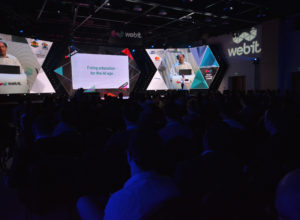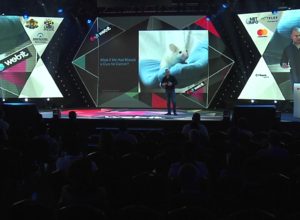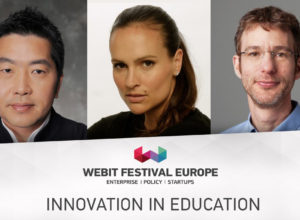Tag: IoE Summit
How to fix our education systems for the AI age
We are all talking about the Fourth industrial revolution and its potential toll on the labour market around the world. As the developments of robots, AI and automation seem inevitable, countries, communities and organizations must find ways to adapt our skills to the needs of the future.
During Webit.Festival Europe we had the chance to listen to one of the people that are going to drive this existential change in the processes of learning. The Director of Strategic and International Development at Wolfram Research Conrad Wolfram shared his thoughts on fixing the education for the AI age and took us on a journey through the challenges education faces today.
Wolfram technology and consulting solutions drives innovation in data analytics, software development and modelling from startups to Fortune 500 companies, in industries as diverse as medicine, finance and telecoms.
Conrad is also recognized as a world authority on fixing Math education, including advocating a fundamental shift to focus on computer-based computational thinking rather than hand calculation.
During his speech, he outlined the main effects computers and AI have on education. The first one is that we need to learn subjects that have changed, because the computers now do work that usually humans used to have to do. The second is that AI gives us the tools for building a more personalized learning, assessment and experience during the learning process.
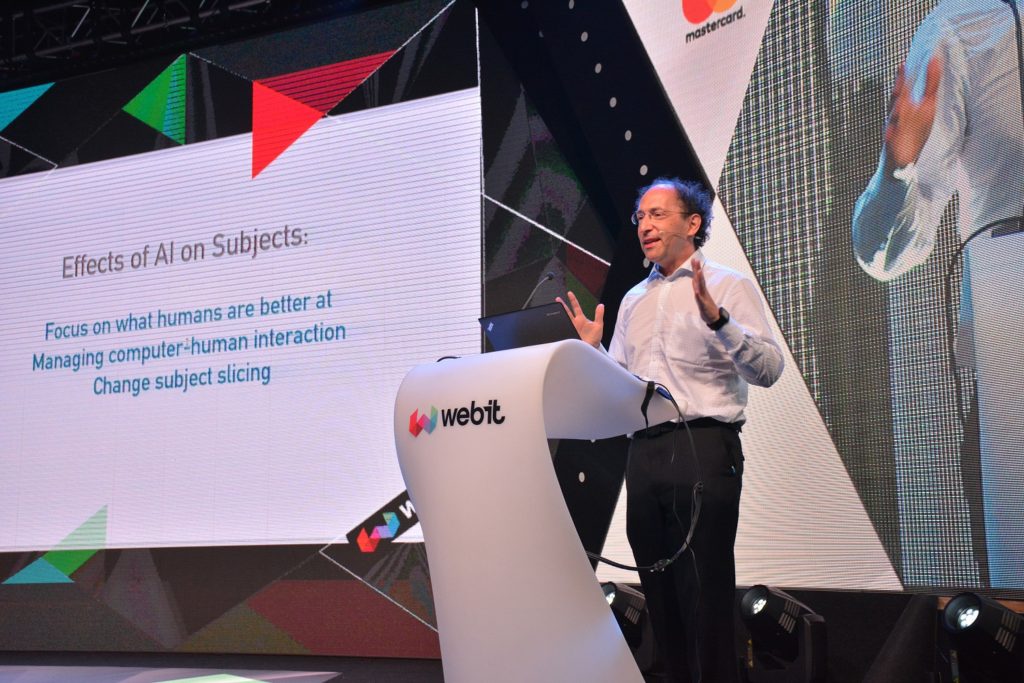 The Director of Strategic and International Development at Wolfram Research Conrad Wolfram.[/caption]
There are at least 3 good reasons for learning the right kind of Math. The first is that it gives us skills for the technical jobs that have powered our economies and continue to do so. The second is that it creates our everyday ability to work in the modern society and deal with the reask that are displayed to us. And the third is that it creates logical thinking about the ways we approach life.
If we talk about the actual essence of Math, we must say that it is a four-step process. You define a question, you translate it to to this abstract notation and the reason you do that is that you can then compute answers much better than you can by talking about it in a normal language, like English or Bulgarian. Then you interpret the results. You take that abstract answer and you go back trying to produce the actual answer to the real question you asked.
The Director of Strategic and International Development at Wolfram Research Conrad Wolfram.[/caption]
There are at least 3 good reasons for learning the right kind of Math. The first is that it gives us skills for the technical jobs that have powered our economies and continue to do so. The second is that it creates our everyday ability to work in the modern society and deal with the reask that are displayed to us. And the third is that it creates logical thinking about the ways we approach life.
If we talk about the actual essence of Math, we must say that it is a four-step process. You define a question, you translate it to to this abstract notation and the reason you do that is that you can then compute answers much better than you can by talking about it in a normal language, like English or Bulgarian. Then you interpret the results. You take that abstract answer and you go back trying to produce the actual answer to the real question you asked.
“The key point to understand is that we need humans to focus on what they are good at and leave computers do the same. And that involves also humans learning how to connect with computers in a meaningful way, so that we have the best interface to get the computers do what we want”, Wolfram said.He gave the example with the ever changing survival skills during the years. Hundreds of years ago it was crucial to be able to make a fire or to kill an animal to eat. There are now different and very modern survival skills to do with computational knowledge. According to him the skill at the top of the future value chain is what we may call computational thinking - knowing how to think in a computational way about life. Around the world we spend many hours of child’s life every week learning Math. But Wolfram thinks that the big question we must ask ourselves is whether this Math is fostering computational thinking, or not? He thinks that right now this is not the wrong subject and we should use all those hours to do much more computational thinking oriented subjects. [caption id="attachment_5052" align="aligncenter" width="640"]
 The Director of Strategic and International Development at Wolfram Research Conrad Wolfram.[/caption]
There are at least 3 good reasons for learning the right kind of Math. The first is that it gives us skills for the technical jobs that have powered our economies and continue to do so. The second is that it creates our everyday ability to work in the modern society and deal with the reask that are displayed to us. And the third is that it creates logical thinking about the ways we approach life.
If we talk about the actual essence of Math, we must say that it is a four-step process. You define a question, you translate it to to this abstract notation and the reason you do that is that you can then compute answers much better than you can by talking about it in a normal language, like English or Bulgarian. Then you interpret the results. You take that abstract answer and you go back trying to produce the actual answer to the real question you asked.
The Director of Strategic and International Development at Wolfram Research Conrad Wolfram.[/caption]
There are at least 3 good reasons for learning the right kind of Math. The first is that it gives us skills for the technical jobs that have powered our economies and continue to do so. The second is that it creates our everyday ability to work in the modern society and deal with the reask that are displayed to us. And the third is that it creates logical thinking about the ways we approach life.
If we talk about the actual essence of Math, we must say that it is a four-step process. You define a question, you translate it to to this abstract notation and the reason you do that is that you can then compute answers much better than you can by talking about it in a normal language, like English or Bulgarian. Then you interpret the results. You take that abstract answer and you go back trying to produce the actual answer to the real question you asked.
“Here is what is going wrong in education. We spend almost all our time learning how to do step 3 by hand. This is the step that computers can do fantastically better than any humans. So what we all should be doing is use computers for step 3 much more and using students much more for steps 1, 2 and 4”, Wolfram said.In school students learn how to solve a linear equation by hand, but in real life the equations we face are much harder and complex. Now our smartphones are able to solve linear equations after a voice command from us. So the key question is why are we spending 10 years of our students lives trying to get them to solve such tasks. Conrad Wolfram founded the computerbasedmath.org to drive implementation of the change. It is now a worldwide force in re-engineering the curriculum with early projects in Estonia, Ireland, Sweden and Africa. The main idea behind the project is that the computer already exist, we have it and it is not going away. And the main task is to figure out how the curriculum should look like. For years we had countries trying to be part of the knowledge economy as opposed to manual labour. The next step is an economy that is driven not only by knowledge, but by the interaction of humans and computation. According to Conrad Wolfram, without a fundamental reform of our education, we are not ready for that. So governments and organizations need to think about innovative ways to unstick the education ecosystem, so that we can have real innovations and not just have to stick with the same things.
“I am avoiding the term Math for much of what I’m now talking, because I think that Math has become a rather toxic word. I like the term computational thinking, but whatever it is called we have to reform what we are doing, either by making a new subjects or by doing a hostile takeover of the old subjects. And it is vital to make that as quickly as possible. Once you got automation in life from machines you need to use it so that humans can go further. We don’t have to make humans compete with the machines, because we will fail”, he said.You may watch Conrad Wolfram’s full lecture here: If you want to keep up with the latest trend in the world of digital economy and technology, then Webit.Festival is the right place for you. Visit our website and book 2 of our Super Earlybird tickets for Webit.Festival Europe 2018 for just €100. Feel the Webit vibe with some of the best photos from this year’s event! [easingslider id="4954"]
IoT is the key to solving the complex world of science
We often think about innovation and science as a one whole thing. But in the age of connectivity and information sharing most of the science-based organizations remain disconnected from the Cloud computing and its amazing capabilities.
Fortunately this is going to change fast because of the fast development of IoT solutions that are going to cut the research and development costs of companies and help them invest more into amazing science discoveries that will benefit all of us.
During the IoE Summit of Webit.Festival Europe the Founder and CEO of Elemental Machines Sridhar Iyengar took us on a journey through the process of making science in the Digital Age and shared his vision about overcoming the obstacles that science-based companies face today.
Sridhar also founded AgaMatrix, a blood glucose monitoring company that made the world’s first medical device connecting directly to the iPhone and shipped 15+ FDA-cleared medical products, 2B+ biosensors, 6M+ glucose meters, with partnerships with Apple, Sanofi, and Walgreens. He is a holder of over 30 US and international patents.
His presentation showed our guests how the IoT technologies are accelerating science-based work and are helping for the development of new drugs and products that are crucial for our common future.
Iyengar explained that for investing in science-based organizations is often perceived as too risky for venture capitalists and angel investors. The main reason is that such activity requires serious initial capital and is still full of unknowns.
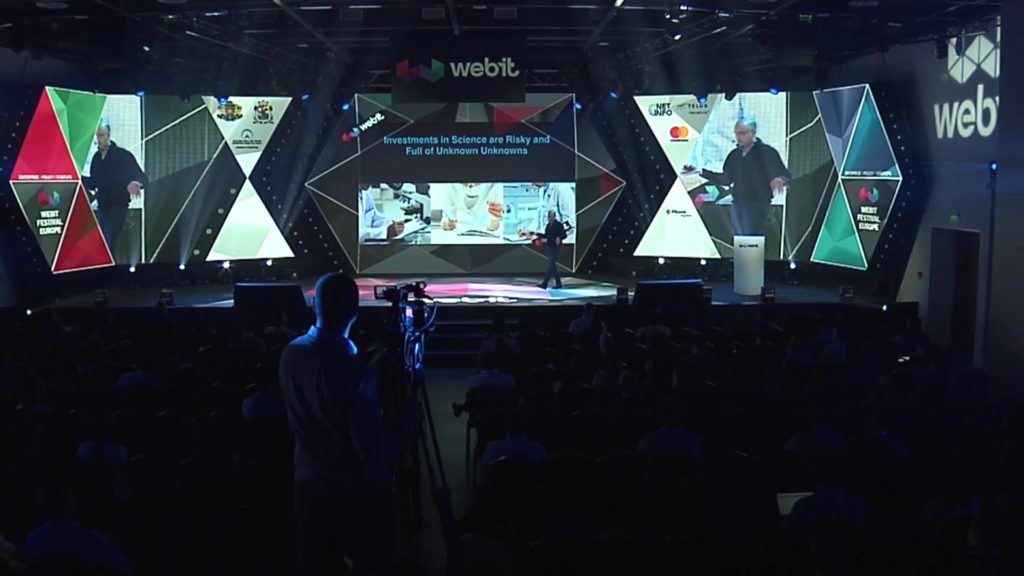 The Founder & CEO of Elemental Machines Sridhar Iyengar[/caption]
Right now pharmaceutical companies invest millions of dollars in research and development, but very little of this scientific world is actually connected to the Cloud. We already have smart homes and devices, and now is the time to develop smart laboratories and factories that are able to share their results and reap the power of cloud computing.
Maybe the best example of that is the San Francisco company Emerald Cloud Lab (ECL), which Iyengar described as “the Amazon for science”. It has developed a fully robotized laboratory. If you have a science experiment you just have to go to their website and code the process and machines will execute it.
The first cloud connected laboratory in the entire world gets the human error out of the equation and guarantees the same results in every execution of the process. In the long-term offering experimentation as service may revolutionize the science-based businesses by cutting their costs and removing the need to develop their own research in development facilities.
Another example of great innovation is the Bay Area company VIUM, which have a digital mouse lab and removes the actual mice from the drug test process. It collect terabytes of data on mice with dozens of sensors.
The Founder & CEO of Elemental Machines Sridhar Iyengar[/caption]
Right now pharmaceutical companies invest millions of dollars in research and development, but very little of this scientific world is actually connected to the Cloud. We already have smart homes and devices, and now is the time to develop smart laboratories and factories that are able to share their results and reap the power of cloud computing.
Maybe the best example of that is the San Francisco company Emerald Cloud Lab (ECL), which Iyengar described as “the Amazon for science”. It has developed a fully robotized laboratory. If you have a science experiment you just have to go to their website and code the process and machines will execute it.
The first cloud connected laboratory in the entire world gets the human error out of the equation and guarantees the same results in every execution of the process. In the long-term offering experimentation as service may revolutionize the science-based businesses by cutting their costs and removing the need to develop their own research in development facilities.
Another example of great innovation is the Bay Area company VIUM, which have a digital mouse lab and removes the actual mice from the drug test process. It collect terabytes of data on mice with dozens of sensors.
“I’m from Boston and biotech companies here raise $40 million as their first round of investment. And most companies don’t raise that much money through the entire process of their existence. Yet if you are going to develop a drug it is going to cost you tens, or even hundreds of millions of dollars”, the expert explained.People who work in technology fields understand Moore’s Law and the fact that the processing power of computers is growing exponentially. But what most of us don’t realize is that in biotech world it is quite the opposite. Eroom’s Law (Moore’s Law spelled backwards) says that as the years goes on the amount of money needed to produce new a single drug is growing. So for every $1 billion dollars that is invested into making a new drug, you get less and less ROI. One of the main obstacles before making science is the fact that every activity is done in the physical world. This creates hundreds of factors that influence and cause variations in the end result. According to Iyengar doing science is very similar to writing code. Working in a laboratory or a manufacturing facility requires following a procedure and a protocol. Code is nothing more than a set of procedures and steps that machine executes. When things co wrong in code, developers have tools, called debuggers. But in science there are no such tools and the debugging process is much harder.
“It is pretty much like baking a cake. You follow recipe, you bake it and supposedly you should get the cake out. If each of us took home the same recipe for chocolate cake and we came back tomorrow, we will probably have dozens of slightly different kinds of cakes, even that we followed the same procedure. In cooking it is okay, but when you are making a drug, it is no”, he said.In software our operating system may be iOS, Windows, Linux or else. But in science-based industry the operating system is the physical world. Because every time doing experiment, every time you test something on a mouse, every time you do a sequence of a genome, the physical world changes. And if you are trying to do the same things in two different days, you have to make sure that all the conditions are the same. This is the most important thing about science - that everything is based on physical properties. When something goes wrong with your final product there are millions things that could have caused why it could went wrong. And finding that is actually really hard and takes a lot of time and resources. [caption id="attachment_5044" align="aligncenter" width="640"]
 The Founder & CEO of Elemental Machines Sridhar Iyengar[/caption]
Right now pharmaceutical companies invest millions of dollars in research and development, but very little of this scientific world is actually connected to the Cloud. We already have smart homes and devices, and now is the time to develop smart laboratories and factories that are able to share their results and reap the power of cloud computing.
Maybe the best example of that is the San Francisco company Emerald Cloud Lab (ECL), which Iyengar described as “the Amazon for science”. It has developed a fully robotized laboratory. If you have a science experiment you just have to go to their website and code the process and machines will execute it.
The first cloud connected laboratory in the entire world gets the human error out of the equation and guarantees the same results in every execution of the process. In the long-term offering experimentation as service may revolutionize the science-based businesses by cutting their costs and removing the need to develop their own research in development facilities.
Another example of great innovation is the Bay Area company VIUM, which have a digital mouse lab and removes the actual mice from the drug test process. It collect terabytes of data on mice with dozens of sensors.
The Founder & CEO of Elemental Machines Sridhar Iyengar[/caption]
Right now pharmaceutical companies invest millions of dollars in research and development, but very little of this scientific world is actually connected to the Cloud. We already have smart homes and devices, and now is the time to develop smart laboratories and factories that are able to share their results and reap the power of cloud computing.
Maybe the best example of that is the San Francisco company Emerald Cloud Lab (ECL), which Iyengar described as “the Amazon for science”. It has developed a fully robotized laboratory. If you have a science experiment you just have to go to their website and code the process and machines will execute it.
The first cloud connected laboratory in the entire world gets the human error out of the equation and guarantees the same results in every execution of the process. In the long-term offering experimentation as service may revolutionize the science-based businesses by cutting their costs and removing the need to develop their own research in development facilities.
Another example of great innovation is the Bay Area company VIUM, which have a digital mouse lab and removes the actual mice from the drug test process. It collect terabytes of data on mice with dozens of sensors.
“They know how much they sleep, how much they walk around, which direction is their nose pointed, how often they feed. And every single thing is captured, so that when something goes wrong you have a huge database where you can go through and debug what may have happened”, Iyengar said.Тhese are two examples of how IoT, connected devices and cloud computing are being applied to drug discovery and science and research, but there are many more to come. You may watch Sridhar Iyengar’s full lecture here: If you want to keep up with the latest trend in the world of digital economy and technology, then Webit.Festival is the right place for you. Visit our website and book 2 of our Super Earlybird tickets for Webit.Festival Europe 2018 for just €100. Feel the Webit vibe with some of the best photos from this year’s event! [easingslider id="4954"]
Webit.Festival will present to you the digital future of education
Technology is rapidly changing the world around us. Many teachers worry that as computers take over most of our daily tasks, there will be no students to teach anymore. But the reality is that education will never disappear, it will just take new forms and will give us the tools we need, so that we can be successful in the society of the future.
Experts predict that one of the main changes to come is the increase in diversity of learning opportunities at different times in different places. This means that in the near future our children will learn the theoretical part of their curriculum outside the classroom, while the practical part will be taught face to face.
This year, Webit.Festival Europe will gather in Sofia Tech Park more than 300 speakers from every corner of the world. Within two days (25th and 26th of April) they will share invaluable experience from the largest enterprises in the digital industry and will explain to more than 5000 attendees from 90+ countries the key factors that will shape our future.
The main theme of the event is re:Inventing Europe’s Future, and what better way to do it, than through quality education and developing the right skill sets for the labour need of tomorrow’s enterprises.
During the Innovation in Education track of the IoE Summit you will get the chance to listen to the Director of Strategic and International Development at Wolfram Research Conrad Wolfram, who will explain how the importance of quantitative understanding for jobs, society and management has exploded over the last few decades. He will also talk about the importance of understanding the changing role of computers and automation of knowledge is crucial.
The CMO of Edulab Norihisa Wada will speak about changing and sustaining learner behavior. Behavior changes are central to all learning conditions. They involve motivating people, increasing their self-efficacy, and altering their intentions, beliefs and desires.
Game mechanics if put to good use are a great way to achieve all these elements. They provide intrinsic motivation, instant feedback and a safe artificial environment to learn. Mr Wada’s presentation will introduce the audience to such “gamify” design and approach trends in learning.
The Opera Singer, Songwriter and CEO of Wurrly Nadine Levitt, will talk about the role technology plays in education, and how such technology can positively impact future learning.
She thinks that educational technology should engage learners and make them participate in and experience the learning processes, just as they no longer consume passively media products.
The CEO of Babbel.com Markus Witte will tell us about the latest trends in languages learning and the changing ways we communicate with each other. In just a few years the market for cloud-based language education has grown into a much-discussed phenomenon and is expected to gross $6 billion by 2021.
Here you can see a full list of the confirmed speakers at Webit.Festival, while here you can get all the information you need about the tickets for the event.
